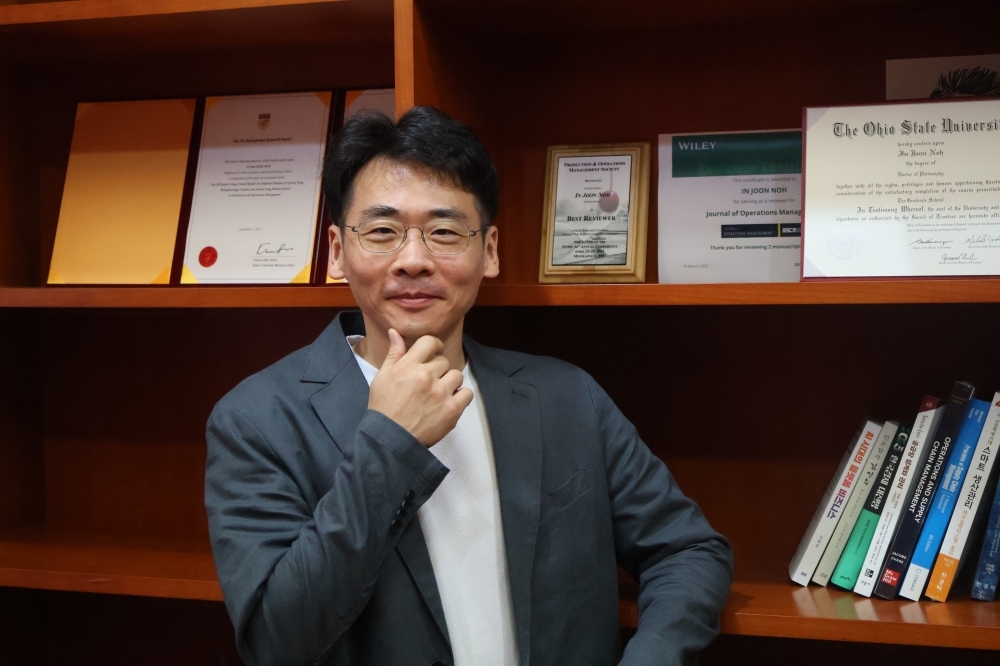News
KUBS News
[SK Paper Award Interview] Professor Injun Noh: “Moving Forward with Curiosity and Patience”
2025.10.13 Views 1190 국제실
[SK Paper Award Interview] Professor Injun Noh: “Moving Forward with Curiosity and Patience”

In 2025, Professor Injun Noh of Korea University Business School co-authored the paper “Are All Generic Drugs Created Equal? An Empirical Analysis of Generic Drug Manufacturing Location and Serious Drug Adverse Events” (with John Gray, George Ball, Zachary Wright, and Hyunwoo Park), which was accepted for publication in the international journal Production & Operations Management and received the Paper Award at the SK Awards. Building on the good news of having also won a Paper Award earlier in the year, Professor Noh shared deeper reflections on the philosophy behind this latest research
Q1. First of all, congratulations on receiving the Paper Award. Could you briefly introduce yourself and your paper?
This study examines the quality issues of generic drugs, which are taken daily by millions of people worldwide. Because of intense price competition and declining profitability, the manufacturing of generics has steadily shifted from advanced economies such as the United States to emerging markets like India. However, information on supply chains—such as where a drug is manufactured—is not clearly disclosed to healthcare providers or consumers, making it difficult to empirically assess how these shifts affect patient safety and product quality.
In our research, we identified a novel data source that enabled us to trace the manufacturing locations of generic drugs and to compare quality outcomes by production site. Using the FDA’s equivalence criteria (same active ingredient, same formulation, and same route of administration), we found that generics manufactured in India showed a significantly higher incidence of serious adverse events compared with identical drugs manufactured in the United States.
This pattern was especially pronounced among older generic drugs facing greater market competition. These findings suggest that in less regulated environments typical of some emerging markets, drug quality—though less immediately visible—may deteriorate in the course of cost-cutting or supply chain optimization.
Q2. What is the most important message this study conveys to academia and industry?
This study is the first to provide large-scale empirical evidence on the quality issues of generic drugs manufactured in emerging markets—particularly India—an area that had previously been discussed only on the basis of anecdotal evidence.
The findings attracted extensive coverage in major global media outlets, especially in the United States. Notably, the core results of the study were cited in discussions by the U.S. House Committee on Energy and Commerce, underscoring its significance and impact.
At a time when healthcare systems worldwide are increasingly dependent on generic drugs as affordable treatment options, this research underscores the urgent need for greater transparency in drug supply chain information, differentiated regulatory approaches that account for manufacturing location and the intensity of price competition, and the establishment of more robust quality monitoring systems.
Q3. Do you have any personal methods for overcoming slumps that are common in academic life or research?
There are times when the numerous responsibilities of being a professor—managing projects, teaching, reviewing papers, and advising students—can feel both physically and mentally overwhelming. At such times, taking a short break to exercise helps me clear my mind and regain focus.
Q4. Are there any new research topics or directions you hope to explore in the future?
While my current research focuses primarily on the U.S. pharmaceutical industry, I hope to broaden its scope to encompass the Korean pharmaceutical sector and, more broadly, the healthcare industry as a whole.
Q5. Do you have any words of advice for students who wish to pursue a career as researchers?
I believe it is essential to observe the world with keen attention and to cultivate a habit of identifying meaningful and intriguing questions. At the same time, achieving lasting research outcomes requires going beyond momentary curiosity and dedicating oneself to sustained effort with patience and perseverance.
A summary of Professor Injun Noh’s paper is introduced below.
Generic drugs provide lifesaving, affordable treatments to millions of people each day. Over the past several decades, the manufacturing of generic drugs has been steadily shifting from advanced economies, such as the United States, to emerging economies, such as India. However, due to the opacity of global drug supply chains, the quality risks associated with manufacturing in emerging economies have not been systematically and empirically examined.
This study aims to fill this gap. To do so, we construct a novel dataset containing information on drug manufacturing locations, which enables us to compare the frequency of serious adverse events among generic drugs produced in different regions. Using exact matching analyses based on the equivalency criteria established by the U.S. Food and Drug Administration (FDA), we find that generic drugs manufactured in India—where most emerging-economy generics are produced—are associated with significantly higher rates of serious adverse events than their equivalents produced in the United States, where most advanced-economy generics are made.
We further find that this key result is driven by mature generic drugs, which are particularly susceptible to operational and supply chain cost-cutting efforts—efforts that may, unfortunately, compromise drug quality. Our findings offer important implications for regulatory policies, particularly regarding the FDA’s oversight of generic drugs.


